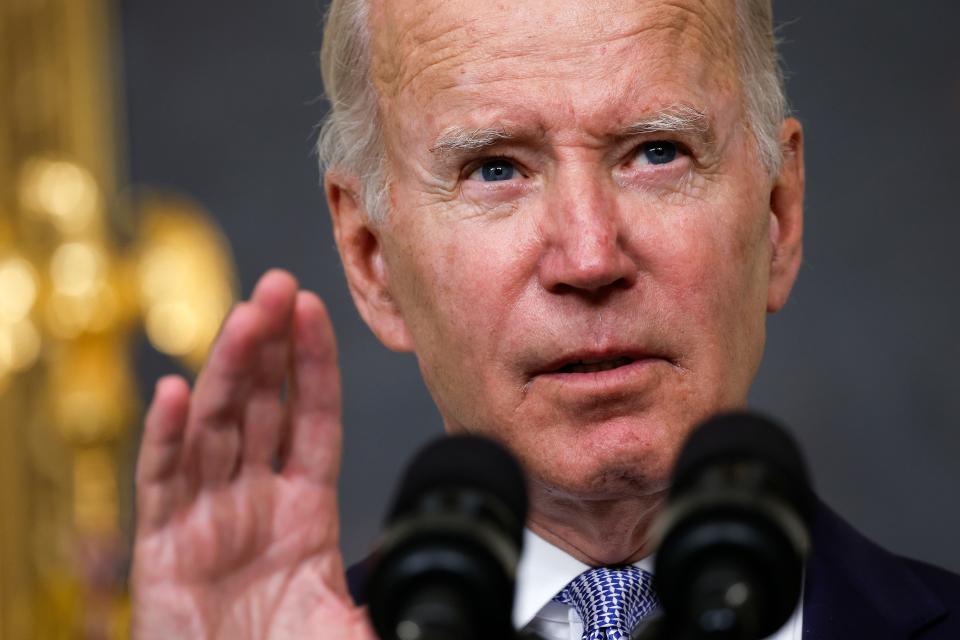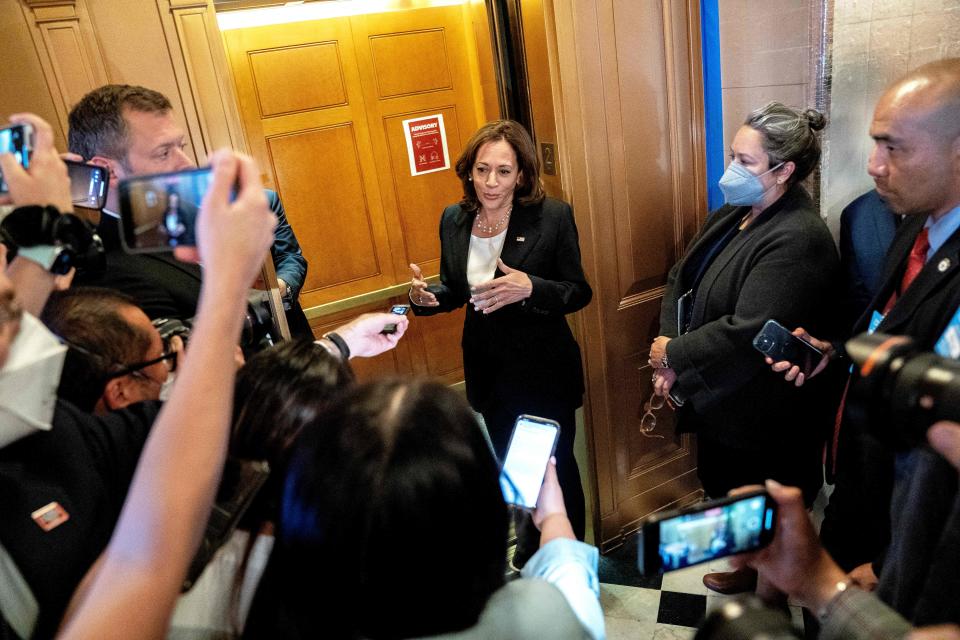Senate OKs sweeping bill lowering drug prices and promoting clean energy, setting up major Biden win
WASHINGTON – Senate Democrats approved sweeping legislation on health care, climate and taxes along a party-line vote Sunday, delivering a major win for President Joe Biden and his agenda before the midterm elections.
The Senate passed the Inflation Reduction Act, which includes record spending on clean energy initiatives, measures to reduce prescription drug prices and a tax overhaul to ensure large corporations pay income taxes. Every Democrat voted in support and every Republican against the measure.
It heads to a vote in the Democratic-controlled House, where it's likely to pass as early as Friday.
Senate Majority Leader Chuck Schumer, D-N.Y., called the bill a "defining legislative feat of the 21st century" and "the boldest climate package in U.S. history" on the Senate floor before the final vote.
"To those of you who have lost faith that Congress can do big things, this bill is for you," he said.
Opinion: Don't believe Trump and the GOP: Biden and the Democrats are winning.

Vice President Kamala Harris cast the tiebreaking vote in favor of the measure after a grueling overnight session of debate, amendments and negotiation. The 15-hour "vote-a-rama" that began at 11:30 p.m. ended with Harris' deciding vote on final passage.
The bill – initially negotiated by Schumer and Sen. Joe Manchin, D-W.Va. – tackles long-standing liberal priorities. The White House's loftier ambitions to expand the social safety net in last year's Build Back Better bill were scrapped during a roller-coaster year of negotiations among Democrats.
"I ran for President promising to make government work for working families again, and that is what this bill does – period," Biden said in a statement issued by the White House after the vote that thanked Democrats for staying unified. "It required many compromises. Doing important things almost always does."
Senate Minority Leader Mitch McConnell, R-Ky., had a different view of the $739 billion package that would raise taxes on certain corporations while reducing the deficit by about $100 billion over the next decade.
"Senate Democrats are misreading the American people’s outrage as a mandate for yet another reckless taxing and spending spree," he said in a statement issued Saturday. "Democrats have already robbed American families once through inflation, and now their solution is to rob American families a second time."
The bill would allow Medicare to negotiate prescription drug prices – long opposed by the pharmaceutical industry – and extend Affordable Care Act subsidies three more years through 2025.
'INFLATION REDUCTION ACT': What you need to know about major effort to fight climate change
To address climate change, the bill includes $10 billion in tax credits to build electric vehicles, solar panels and wind turbines; $7,500 tax credit rebates for consumers to buy electric vehicles; and $9 billion for energy-efficient home retrofits for low-income Americans.
There's up to $20 billion for loans to support electric vehicle plants, $20 billion to assist farmers and ranchers with climate change and $30 billion for cities and states to transition utilities to clean electricity.
To pay for these and other measures, the bill would establish a 15% corporate minimum tax and beef up enforcement of the Internal Revenue Service.

The bill would raise about $739 billion in tax revenue, more than offsetting the $433 billion in proposed spending. The legislation would decrease the federal deficit by $102 billion over the next decade, according to the Congressional Budget Office.
The bill didn't pass unscathed: Republicans stripped a $35 monthly cap on insulin co-pays via amendment, arguing the provision violated procedural rules. Seven Republicans sided with Democrats to try to keep the measure in place: Sens. Bill Cassidy of Louisiana, Susan Collins of Maine, Josh Hawley of Missouri, Cindy Hyde-Smith of Mississippi, Sen. John Kennedy of Louisiana, Lisa Murkowski of Alaska and Dan Sullivan of Alaska.
Democrats lowered the cost of insulin through Medicare in the bill, as Republicans' amendment targeted only the cap on insulin co-pays for private insurers.
WHAT LED UP TO THIS?: Senate Democrats push sweeping climate, health care bill as Republicans try to slow passage
Negotiations for the legislation appeared dead on multiple occasions, picking up only in recent weeks and culminating in a surprise agreement by Schumer and Manchin last week.
Democrats secured enough support to pass the bill in the evenly divided Senate when Sen. Kyrsten Sinema, D-Ariz., said Thursday she would vote for it after securing commitments on drought relief and tax changes.
Amid 40-year-high inflation, Democrats framed and titled the legislation as a way to bring down consumer costs, but economists disagree on how effective it would be in that regard.
The University of Pennsylvania's Penn Wharton budget model predicted the impact on inflation would be "statistically indistinguishable from zero" over the long term and slightly increase inflation before 2024.
An analysis from Moody's Analytics found the legislation would "nudge the economy and inflation in the right direction, while meaningfully addressing climate change and reducing the government’s budget deficits."

Schumer, in a news conference after the vote, called the bill “the most significant bill to fight the climate crisis ever."
But he also said throughout negotiations that he told his caucus they “were going to have to swallow some bad stuff to get the good stuff,” like permitting reform backed by Manchin that’s seen as beneficial to the fossil fuel industry.
And while the Inflation Reduction Act did not include many of Biden’s sweeping social programs proposed in his original Build Back Better plan, like the child tax credit and family leave, Schumer said that Senate Democrats “would return to those issues with a vengeance in the fall.”
This article originally appeared on USA TODAY: Climate and health care bill passes as part of Inflation Reduction Act

 Yahoo Movies
Yahoo Movies 